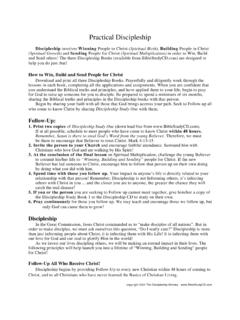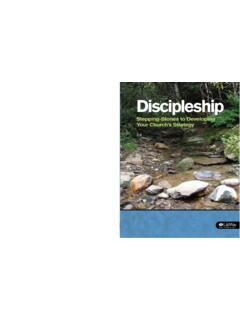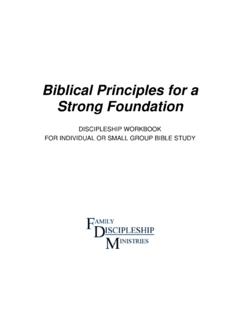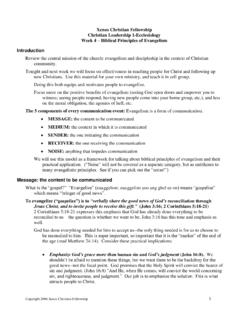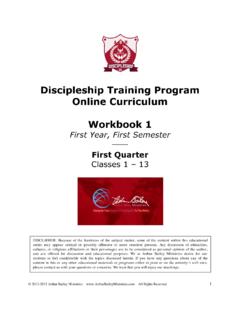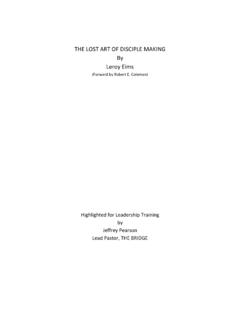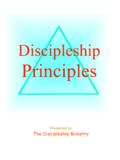Transcription of Seven Principles of Biblical Discipleship
1 Seven Principles of Biblical Discipleship By Dr. David A. DeWitt What is and what is not Biblical Discipleship ? What must I do in order to disciple someone? What must I become if I am to be a disciplemaker? Biblical Discipleship is the act of one person intentionally impacting the life of some other person in the direction of Christlikeness (2 Timothy 2:2). So Biblical Discipleship is: Intentional -- Discipleship is not simply someone learning about Christ. It is not accidental. It s intentional. It is not a function of the learning of the learner but of the teaching of the teacher. Someone must intend to do it. Impacting -- Discipleship has not happened because a student is excited about or impressed by a teacher. Discipleship brings about a change in virtues, values, beliefs, and lifestyle. Personal -- Discipleship is not covering material. Neither is it being part of a group (a class, congregation, family, etc.)
2 Discipleship is one person dealing with another person personally. Christlike -- Discipleship is not just a mentee modeling a mentor. The modeling must be moving in the direction of Christlikeness. Seven Principles (1) Biblical Discipleship is incarnational. Incarnational means in-the-flesh. ( Carnation means flesh. For example, chile-con-carne means chile with flesh. Carnal desires are fleshly desires, etc.) In-the-fleshness is what God used to reveal Himself to us in the person of Jesus Christ (John 1:14 and 1 John 1:1). Christ s apostles continued the incarnational approach. Paul reviews his ministry with the Thessalonians by comparing himself to a nursing mother tenderly caring for her own children, and giving them not only the Gospel but his own life (1 Thessalonians 2:7-8). So Biblical Discipleship is done in the flesh. It cannot be done via books or tapes or TV or speakers in auditoriums. All of these things may be useful, but Discipleship is being there.
3 (2) Biblical Discipleship is reproductive. Being productive is not a goal of Biblical Discipleship . Businessmen, sportsmen, professionals, even pastors and evangelists, are usually considered productive when they accomplish a quantitative goal. Biblical Discipleship , however, emphasizes: (a) multiplication, not addition (b) quality, not quantity (c) the potential people have, not the positions they hold (See Matthew 28:18-20; 1 Corinthians 1:11; 1 Thessalonians 1:6-8.) Consider the impact of a lifestyle of Discipleship : In one year, an evangelist reaching 1000 people a day would reach 365,000 people. Someone discipling one person a year, who reproduces that with one other person a year, would reach two people. Distributed by In ten years, an evangelist reaching 1000 people a day would reach 3,650,000 people. Someone discipling one person a year, who reproduces that with one other person a year, would reach 1,024 people.
4 In 25 years, an evangelist reaching 1000 people a day would reach 9,125,000 people. Someone discipling one person a year, who reproduces that with one other person a year, would reach 33,554,423 people. (3) Biblical Discipleship invites personal discovery. A disciple has to discover truth for himself. The discipler s job, then, is to present truth that must be self-discovered. Jesus often presented things in such a way that people had to look beyond the obvious and make the effort to discover what He meant. In John 2 He threw the money changers out of the Temple. When challenged about it, He said, destroy this Temple and in three days I will raise it up (verse 19). He was referring to His own bodily resurrection, but understanding that was not easy. In John 3 Jesus required Nicodemus to discover what it meant to be born again (verse 7). In John 4 the woman at the well had to discover what He meant by living water (verse 10).
5 In John 6 the disciples had to discover what it meant to eat His flesh and drink His blood (verse 53). Discipleship was never simply a matter of parroting back answers or learning a program. It required a faith and focus that led to self-discovery. (4) Biblical Discipleship reasons, persuades, and gives evidence. Discipleship is not based on mysticism, emotions, or blind faith. Through Isaiah God told Israel, Come now, and let us reason together (Isaiah 1:18). Concerning Paul s Discipleship , we read that he was reasoning in the synagogue every Sabbath and trying to persuade Jews and Greeks (Acts 18:4). We also read that Paul reasoned with them from the Scriptures, explaining and giving evidence that the Christ had to suffer and rise again from the dead (Acts 17:2-4). (See also Acts 19:8-10; 28:23-24.) (5) Biblical Discipleship counts the cost. One of the differences between Discipleship and mentoring is the cost involved.
6 Jesus said, if anyone comes to Me; first sit down and calculate the cost (Luke 14:26-28). In this passage Jesus gave us two costs to count: The first is the cost concerning others. He said we must hate our family and those close to us. Hate is not the opposite of love: apathy is. Rather, it is a choice which prioritizes one over the other (Malachi 1:2-4). The second cost has to do with ourselves. Jesus said we must hate our own lives (Luke 14:26) and lose ourselves for His sake (Matthew 10:39; see also Ephesians 5:29). (6) Biblical Discipleship is giving. God loves extravagance and hates stinginess (Luke 6:38). Discipleship is extravagant giving, which involves laying down our lives for others (John 15:13). It is an act of love, and love always results in giving of the sort that expects nothing in return (John 3:16; Ephesians 5:25). One of the greatest challenges for maturity in life is to learn how to become a giver (of time, talent, resources, etc.)
7 , not just money). (7) Biblical Discipleship has an eternal perspective. Let s look at the example of Jesus Christ again (1 Corinthians 11:1), this time from John 5: He pointed people only toward God (verse 19). He did only what God was doing (verse 20). He sought only God s will (verse 30). He judged only with God s judgment (verse 30). Questions and Answers Q: What is and what is not Biblical Discipleship ? A: Biblical Discipleship is intentional, impacting, personal, and Christlike. So instruction--even good instruction--which is by chance, just academic, without personal involvement, and not related to Jesus Christ, is not Biblical Discipleship . Distributed by Q: What must I do in order to disciple someone? A: I must (1) physically be with them, (2) lead them to reproduce themselves in others, (3) help them discover the truths of God s Word for themselves, and (4) reason, persuade, and give evidence.
8 Q: What must I become if I am to be a disciplemaker? A: I need to (5) become someone who counts the cost, (6) become a giver who expects nothing in return, and (7) develop an eternal perspective. Distributed by
